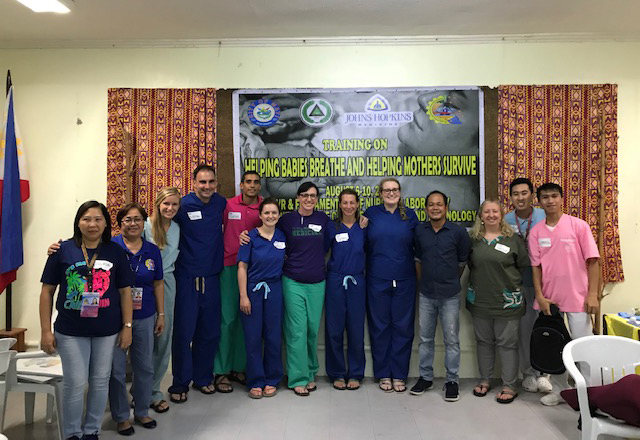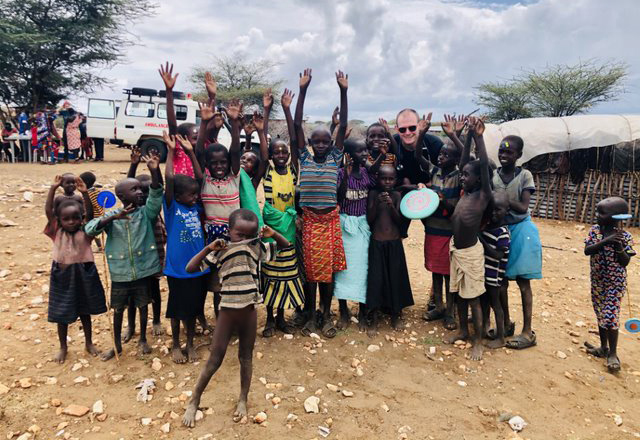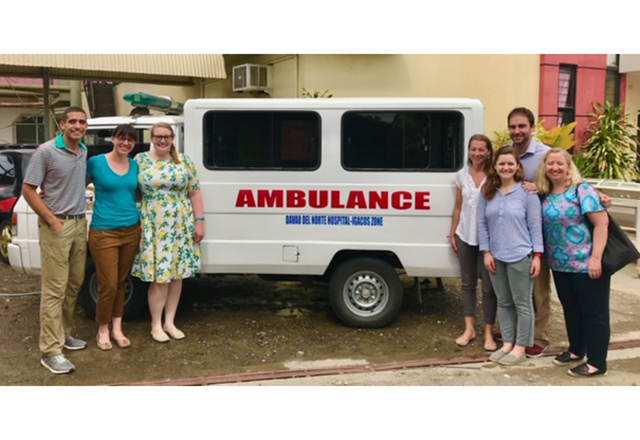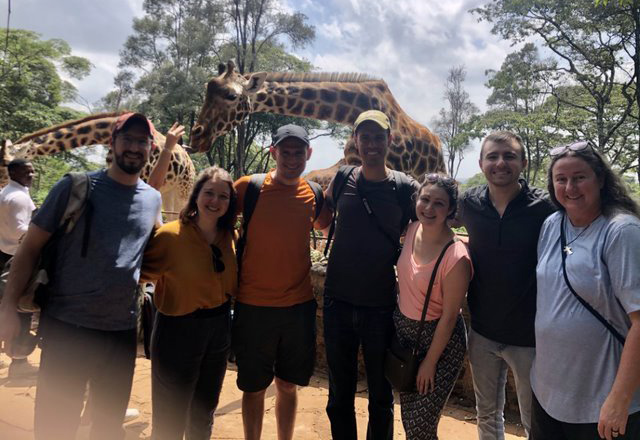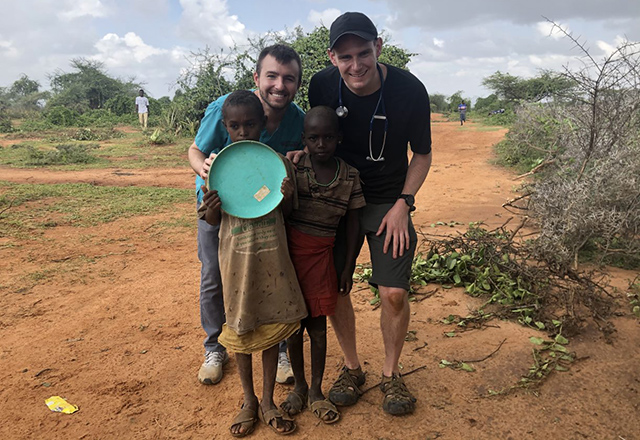Training Tracks
Global Health Track
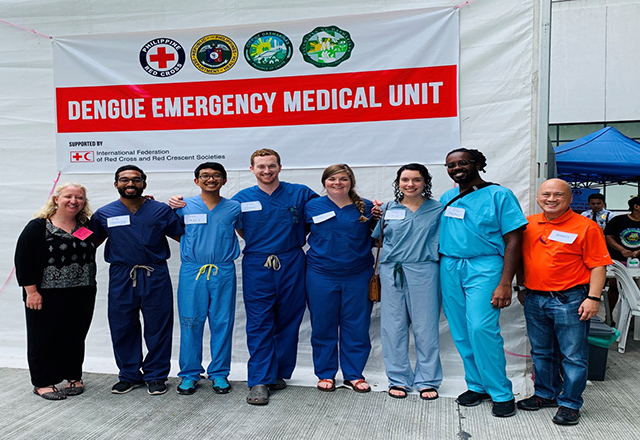 Pediatric Residents with Dr. Nicole Shilkofski and Filipino physician colleagues in Cavite, Philippines.
Pediatric Residents with Dr. Nicole Shilkofski and Filipino physician colleagues in Cavite, Philippines.We aim to train pediatric leaders who will work in the field of global health to eliminate health disparities through advocacy, research, community partnership, education and clinical care.
While all residents in the program are encouraged to pursue overseas global health rotations during their PGY2 or PGY3 years, residents in the global health track will dedicate a minimum of two months of elective time during residency toward international rotations and development of a longitudinal capstone project at one field site.
In collaboration with their career adviser and track mentor, each resident will develop an individualized learning plan that provides an opportunity for faculty to connect them to specific institutional resources to enhance their professional career development within both pediatrics and global health. View the introduction to the global health track.
The five pillars of global health education will include:
- A stateside curriculum
- Pre-departure preparation
- Global health elective experiences
- Post-return debriefing
- Curriculum evaluation, with a focus on capstone project development and implementation
Established field placements for electives currently exist in Malawi, Bangladesh, Lesotho, Nigeria, Kenya, Philippines, Myanmar, Uganda, Haiti and Peru, among many others available through the School of Public Health and Center for Global Health.
All residents in the track will complete pre-departure coursework through the Johns Hopkins Center for Global Health, which provides funding for many of the international elective experiences through the Paul S. Lietman Global Travel Grants for Residents.
Residents in the track are also eligible to take up to 16 credits per year of coursework through the school of public health. For example:
- Foundations of International Health
- Issues in the Reduction of Maternal and Neonatal Mortality in Low-Income Countries
- Health Systems in Low- and Middle-Income Countries
- Infectious Diseases and Child Survival
- Child and Public Health in the Tropics
Residents will be expected to present their scholarly work and capstone projects at the annual School of Public Health Global Health Day and at international conferences, such as the annual meeting of the Consortium of Universities for Global Health (of which Johns Hopkins is a member).
Snapshots from Our Global Health Program
Relationships and Collaborations
The global health track leverages relationships and collaborations across the Department of Pediatrics and the larger Johns Hopkins University community, including:
Johns Hopkins Bloomberg School of Public Health
- International Center for Maternal and Newborn Health
- Center for Global Health
- Center for Clinical Global Health Education
The Johns Hopkins University
- Center for Health Equity
- Urban Health Institute
- Fogarty Global Health Fellowship
- Global Health Pathway Program
- Alliance for a Healthier World
Johns Hopkins University School of Medicine
Current Global Health Track Residents
Meet Our Residents
Dr. Mallika Rajamani
Dr. Mallika Rajamani is a 3rd year resident in the global health track whose interest in global maternal and child health started during pursuit of her MPH degree, during which time she completed a practicum with an NPO based out of Hinche, Haiti. She also had the opportunity to pursue a pediatrics rotation during medical school at CMC Vellore in India. Her clinical interests are currently in neonatology or cardiology, and she is particularly interested in conducting research on newborn health outcomes or ways to increase timely access to care. She is working with a mentor from the Johns Hopkins International Vaccine Access Center (IVAC) to implement a project based in India during residency.

Dr. Kaysha Henry
Dr. Kaysha Henry is a 3rd year resident in the global health track who was raised in Antigua. She pursued an MPH degree and focused her capstone project during that time in Belize. Her clinical interests include primary care and adolescent health and she is particularly interested in mental health in children and adolescents. Her project during residency will focus on menstrual hygiene in limited resource settings.
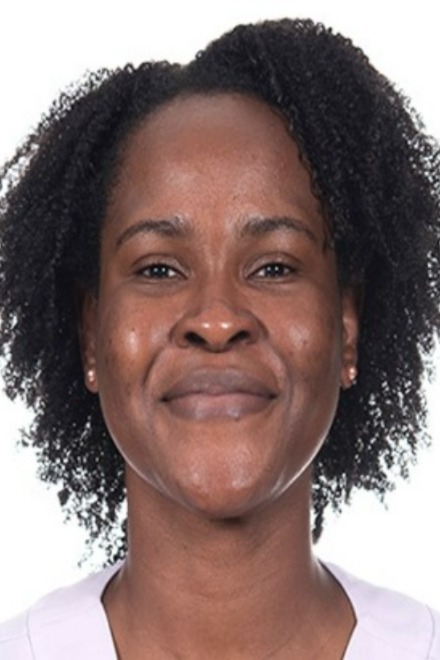
Dr. Andy Koltun
Dr. Andy Koltun is a 2nd year resident in the global health track who brings with him his experience allying with diverse stakeholders to devise community health and redevelopment initiatives in rural Uganda and Colombia. He also has helped inform intergovernmental One Health policy solutions for low-resource settings globally. Clinically, he is interested in the intersection of infectious diseases care and the development of robust, equitable population health systems in low- and middle-income countries. He is excited to be at Hopkins for the extent of its global health and health equity missions and for the warm and inspiring mentorship found here.
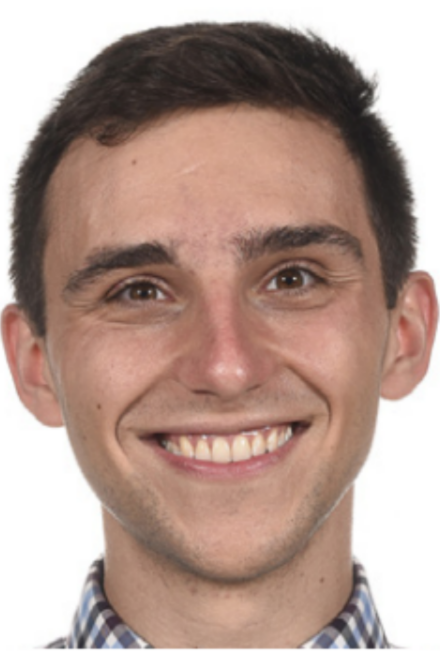
Dr. Sarah Benett
Dr. Sarah Benett is a second year resident in the global health track who first became interested in Global Health as an undergraduate student at Johns Hopkins where she worked in Honduras, India, South Africa, and Brazil. She continued this interest throughout medical school at the Medical College of Wisconsin where she specifically focused on child neurodevelopment in Uganda. As a pediatric global health resident, she is interested in medical education and implementation of curriculum in developmental screening in limited-resource settings.
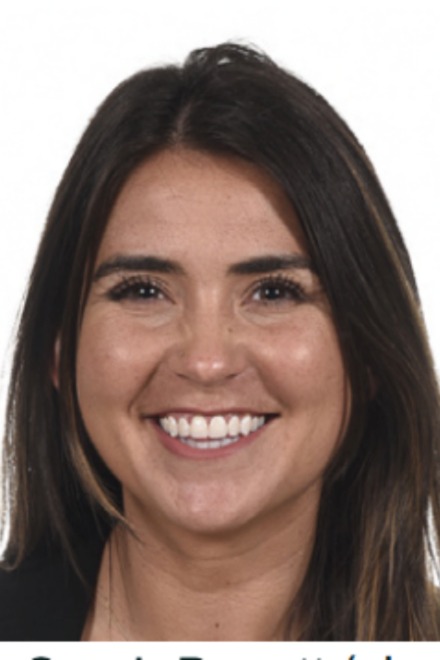
Dr. Charlotte Gemes
Dr. Charlotte Gemes is an intern in the global health track whose interest in global health started while an undergraduate at the University of Virginia where she participated in a qualitative public health research program in Cape Town, South Africa. Following this, she conducted research in Kigali, Rwanda where she looked at what factors influence mothers’ decisions on whether to breastfeed their babies. She continued her global health interest in medical school at the University of Vermont where she rotated at a local federally qualified health center with a diverse patient population including immigrants from a variety of countries. She also participated in a pediatric rotation in Harare, Zimbabwe prior to graduation. She is undecided thus far in her career plans, but hopes to integrate work abroad.
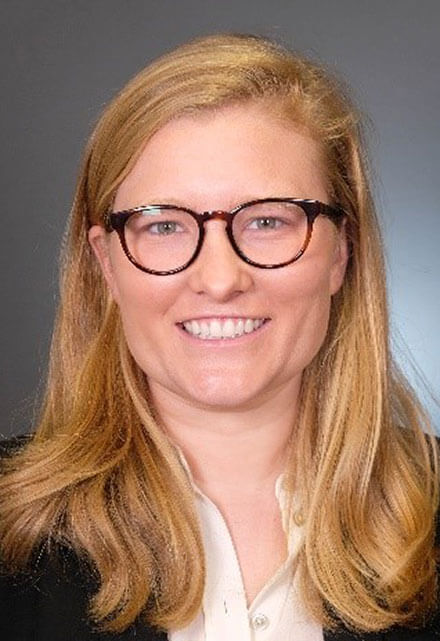
Dr. Dilys Osei
Dr. Dilys Osei is an intern who was born in Accra, Ghana and became interested in global health at a young age after witnessing disparities within her family's community in Ghana in terms of limited and delayed access to care in rural villages. She was involved in local global health initiatives during her undergraduate education at Emory University where she helped refugees from the Democratic Republic of Congo assimilate into the United States. Her global health interests during residency and longitudinally include improving access to care and the timely and safe transportation of critically ill patients to health care facilities in limited resource settings.

Health Equity Track
We envision a world where every child, regardless of their background, has the opportunity to reach their full potential. We aim to train pediatric leaders who will work to eliminate health disparities through advocacy, research, community partnership, education and clinical care.
The Harriet Lane Pediatric Residency Program has been building leaders in the field of pediatrics for more than 100 years. With a combination of innovative curricula, a world-class faculty, robust clinical experiences, and opportunities for independence and team leadership, our program has an international reputation for providing exceptional pediatric training. Located in East Baltimore, the program also has a long-standing commitment to serving and advocating for children and families in our local community as well as nationally.
To train leaders in health equity, the program will leverage world-renowned resources across Johns Hopkins to provide graduates with a unique skill set that will equip them to make an impact for children affected by health disparities. View the introduction to the health equity track.
Relationships and Collaborations
The health equity/urban health track will leverage relationships and collaborations across the department and the institution, including:
Johns Hopkins School of Medicine
- The Center for Child and Community Health Research
- Centro SOL – Center for Salud/Health & Opportunities for Latinos
- Center for Transgender and Gender Expansive Health
- Rales Center for the Integration of Health and Education
Johns Hopkins Bloomberg School of Public Health
- Bloomberg American Health Initiative
- Center for Adolescent Health
- Center for Gun Policy and Research
- Center for Injury Research and Policy
- Center for the Prevention of Youth Violence
- The Child and Adolescent Health Measurement Initiative
- Department of Population, Family and Reproductive Health
The Johns Hopkins University
The three pillars of the track are mentorship, advocacy and skill building, and scholarship.
Pillars of the Program
The three pillars of the Health Equity track are mentorship, advocacy and skill building and scholarship.
In addition to the foundational experiences of the Harriet Lane Pediatric Residency Program, the health equity/urban health track will offer the following opportunities and tailored curriculum:
Mentorship: Residents in this track will receive longitudinal mentorship from accomplished Johns Hopkins faculty members who are actively engaged in addressing problems of health equity. Over the first six months, residents will work with program leadership to build a longitudinal mentorship and scholarship oversight team based on their individual interests and institutional areas of focus.
Advocacy and skill building: Residents will work with their mentors and program leadership to develop an individualized learning plan that will leverage continuity clinic and elective time in all three years of residency to build a foundation of skills that will prepare them for careers in this area. Potential examples include:
- Courses and workshops at the Johns Hopkins Bloomberg School of Public Health
- Advocacy rotations at the national, state and city level
- International/global health advocacy rotations including:
- Clinical immersion experiences — Nigeria, Guyana, Solomon Islands, Kenya
- Malnutrition camp experiences — Haiti
- Medical education research collaborations — Philippines
- Global health research opportunities — Lesotho, Bangladesh, Malawi
- Community pediatric experiences serving diverse populations, including
- The Harriet Lane Clinic — pediatric and adolescent clinics (winner of the 2013 Academic Pediatric Association Health Care Delivery Award)
- Intensive Primary Care Clinic — for children and adolescents with or affected by HIV
- Children’s Medical Practice, Bayview
- Center for Addiction and Pregnancy, Johns Hopkins Bayview Medical Center
- Johns Hopkins Community Physicians (East Baltimore Medical Center, Remington and other sites)
- Home visitation during community hospital medicine rotation at St. Agnes Hospital
- Electives working with high-risk and underserved populations in Baltimore and other locations (e.g., Latino health elective; Baltimore Child Abuse Center; community health elective; school-based health elective at the Rales Center; Indian Health Service elective in Tuba City, Arizona; international adoption elective; refugee health with International Rescue Committee)
- Opportunities to network and collaborate with health equity-focused peers from the Medicine-Pediatrics Urban Health Residency Program and the urban health internal medicine primary care track
Scholarship: Residents will work with their mentors to develop a scholarly capstone project related to health equity and/or underserved urban populations, which will be completed over the course of the residency. Elective time in the PGY (postgraduate year) 2 and PGY3 can be dedicated to this project. Presentation of this scholarship at national meetings in the PGY3 is encouraged and is a goal of this program.
We encourage residents to consider the vast resources at the institution and to work with an existing research or advocacy team to implement their project.
Resources
We encourage residents to consider the vast resources at the institution and to work with an existing research or advocacy team to implement their project. A sample of recent work from our faculty in this area includes:
- Starting Early: A Life-Course Perspective on Child Health Disparities (a research action agenda) (Pediatrics)
- Health Disparities Across the Lifespan — Where Are the Children? (JAMA)
- Translating Life Course Theory to Clinical Practice to Address Health Disparities (Maternal Child Health J)
- A Call to Improve the Health and Healthcare of Latino Children (J Pediatr)
- Promise and Perils of the Affordable Care Act for Children (JAMA)
- Quality Healthcare for Children and the Affordable Care Act: A Voltage Drop Checklist. (Pediatrics)
- Child Health Disparities: What Can a Clinician Do? (Pediatrics)
- Breaking the Intergenerational Cycle of Disadvantage: The Three Generation Approach (Pediatrics)
- Caregiver Health Promotion in Pediatric Primary Care Settings: Results of a National Survey (J Pediatr)
- Home Visitation by Pediatric Residents — Perspectives from Two Pediatric Training Programs (Acad Pediatr)
- Extending the Medical Home into the Community: A Newborn Home Visitation Program for Pediatric Residents (Acad Pediatr)
- Merging Systems: Integrating Home Visitation and the Family-centered Medical Home (Pediatrics)

